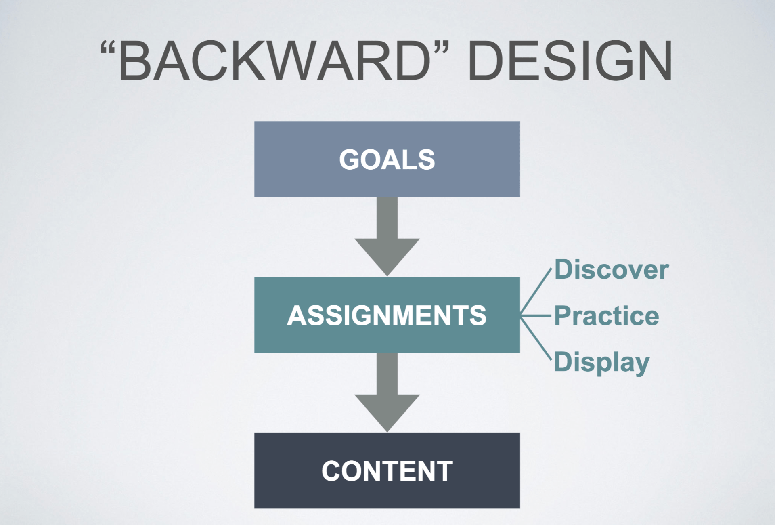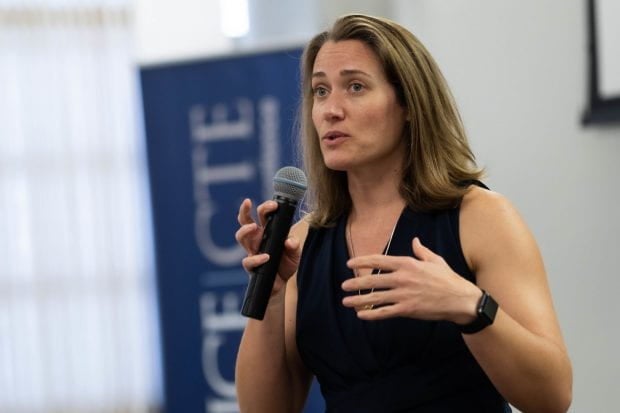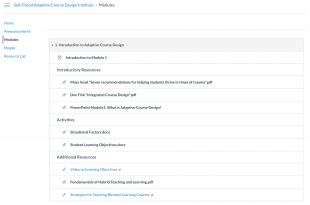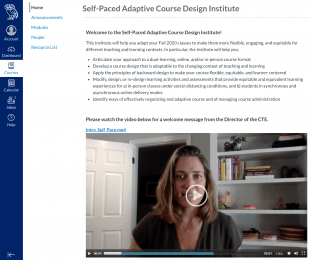When Rice professors learned the university would be offering a dual-delivery system for courses during the fall 2020 semester — a combination of in-person and online classes due to the ongoing pandemic — they did what you’d expect at an institution renowned for its commitment to quality teaching.
Across the university, professors dropped summer plans the coronavirus outbreak hadn’t already canceled and learned everything they could about designing and teaching courses online, thanks to the Adaptive Course Design Institute offered by Rice’s Center for Teaching Excellence (CTE).
“Rice is a research university, so faculty are mostly spending their summer doing research, and we are spending our summer kind of preparing for the upcoming year, getting all of our programming ready,” said Robin Paige, director of the CTE. “That's not what we did this summer.”
Paige and her team quickly rallied, creating the Adaptive Course Design Institute from scratch in only three weeks. Knowing the fall semester would be a challenge for everyone, CTE assistant director Ania Kowalik, CTE associate director Amanda Jungels and Paige worked around the clock to deliver a much-needed resource for faculty — and, by extension, their students.
The end result was a five-day institute for professors and lecturers, offered both synchronously and asynchronously. Grounded in research, the institute coached them on modifying learning assignments and the way they assess students as well as applying the principles of backward design to make their courses flexible, equitable and centered on students.
The institute employed Canvas to provide access to readings, resources and planning activities, providing grounded experience with the teaching platform for professors who hadn’t used it before.
Nearly 200 faculty have already participated in the Adaptive Course Design Institute, led by Paige, Kowalik, Jungels and the CTE’s Faculty Fellows, who also contributed greatly to the project. Their zeal, Paige said, was inspiring.
“This is one of the things that I think is so impressive about the faculty at Rice,” she said. “They invested a week. It was two hours with us over Zoom every day, but about three to four hours a day of work overall with the guided planning. And that's a huge investment, especially during the summer when they have kids at home, they’re doing research and we’re in the middle of a pandemic.”
‘Yes, teaching is important’
Richard Stoll, the Albert Thomas Professor of Political Science, was one of the hundreds of faculty members who signed up for the institute.
Stoll has seen plenty of pivots since beginning his teaching career at Rice in 1979, but nothing quite like what the pandemic has wrought in 2020: a spring semester cut in half and quickly moved online, and now a fall semester with a complex dual-delivery system.
“We're going into a new semester, and in least in principle everyone — both faculty and students — is supposed to be ready for this,” Stoll said. “But it's still difficult.”
After a spring that was more relaxed in its expectations of students, considering issues caused by the pandemic, academic standards would be higher for the fall semester. Knowing that was part of the reason Stoll was eager to get the CTE’s guidance on redesigning his courses. But Stoll also teaches a popular introduction to international relations course that’s typically 80% freshmen. This year, it will be entirely online.
“I will have a lot of students for whom this is their first semester in college, so you want that to be a positive experience for them,” Stoll said.
A longtime associate at Jones College, Stoll eats lunch in the commons at least twice a week. He also looks forward to getting to know his students face to face each semester and letting them know he’s more than a professor; he’s an advocate, someone they can come to with problems whether they’re related to political science or anything else.
The award-winning teacher knows that these sorts of interactions are crucial to maintaining Rice’s close-knit community — and yet this will be a semester with few opportunities for face-to-face connection.
“Imagine you're a freshman student who hasn't been able to come on campus so you really haven't been part of your college,” Stoll said. When difficulties arise for these students, they might be less inclined, he said, to approach magisters or professors they haven’t met in person.
“There are a whole bunch of challenges about how you run your class, but also you have to find ways to help students who may have all sorts of problems,” he said.
This was another crucial point addressed by the CTE’s institute, through discussions of trauma-informed teaching and balancing empathy with expectations.
“The students are traumatized; we're traumatized,” Paige said. “We have to be gentle with them and ourselves, but that doesn't mean lowering expectations for them or for ourselves.”
What the Adaptive Course Design Institute also offered was hands-on assistance with building courses that create a context for reaching the high expectations Rice faculty and students set for themselves.
“I think the CTE is an incredibly valuable resource for people to deal with teaching issues such as, ‘How can I be effective in the classroom?’ but also all the other things that can come up that are particularly salient this semester,” Stoll said.
Having a center at Rice that invests its time and energy like this, he said, “sends a very powerful message to everyone who is teaching here that, yes, teaching is important.”
Laying the groundwork
The spring transition to online teaching was both memorable and challenging, said assistant professor of English Emily Houlik-Ritchey, and fall loomed large on the horizon.
Among Houlik-Ritchey’s many teaching and mentoring awards at Rice was this year’s George R. Brown Teaching Grant, which she co-sponsored with a group of English graduate students, and last year’s recognition as McMurtry College Outstanding Faculty Associate. Her in-demand Arthurian literature course is always waitlisted, a favorite with juniors and seniors.
But, she admitted, at first she couldn’t figure out exactly how to translate this class — which emphasizes active and collaborative learning — into an online experience. So when she saw that the CTE was offering a course to help faculty navigate these choppy waters, she signed up immediately.
“I’ve been involved in a lot of the events that CTE has offered over the years,” said Houlik-Ritchey, who typically attends the CTE's workshops, colloquium and other training sessions. “I’ve always found their material to be really great and useful, and I trust their presentation of information.”
The institute helped her model how to use Canvas modules in creative ways and introduced her to other online collaborative learning tools that have provided her with a new, complementary set of teaching skills.
“I have a clearer sense after the institute of what some of the challenges are going to be and how to tackle them,” Houlik-Ritchey said. “Hopefully, the groundwork that that we can lay using these strategies is going to be really solid.”
She knew that online Canvas trainings already existed, of course, but never knew “how cool and creative” the platform could be.
“The fact that the institute was using Canvas in these really effective ways just opened my mind,” she said. “Part of what they all have done is to help me be more aware of what has always been out there that I've just been underutilizing.”
‘This was the highlight of my summer’
After classes went online last semester, Carrie McNeil, a lecturer in chemistry and in natural sciences, had to get creative with her labs. That’s how she ended up culturing bacteria from her husband’s nose and demonstrating experiments with germ-killing honey over Zoom every week. The students loved it. But it was, she and her husband both decided, not a long-term solution.
Some Rice students will be on campus and able to attend labs in person this fall. But McNeil knew this wouldn’t be the case for everyone.
“The CTE really helped me figure out how can I try to make it work where the students might not necessarily have the same project if they're away from campus,” she said.
Part of the solution was partnering up with her peers in chemistry and biosciences to create videos the students can watch before class, in lieu of on-site lab work. Unlike in-person demonstrations, she said, these videos can be reviewed and studied for those who learn best with plenty of repetition.
McNeil was just as concerned with making sure remote students felt connected — to the assignments and to each other.
“In the spring, they had a chance to get to know each other and share phone numbers and feel comfortable talking to each other, but I can imagine this fall it will be a much different feeling,” she said. “I want to try to still foster that community and that collaboration, so some of the things that we did through the CTE — like learning how to build that community through Canvas discussions and video and doing Zoom stuff — really helped me to take all my scattered thoughts and just focus for that one week on just how can I make this work online.”
Creating a space for the faculty to share their own thoughts and concerns about online teaching was also done by design, Paige said.
“I think one of the nicest things for faculty was it gave them a community to really talk about what they’re doing, because, you know, we don't have the opportunity have those hallway conversations or walk into somebody's office and say, ‘What are you doing with your class?’” she said. “That was definitely one of the biggest outcomes.”
The deluge of positive feedback Paige has received from the faculty who participated has been deeply encouraging. And McNeil is among those fans.
“I was getting to collaborate with other people that I would not normally get a chance to, because we're scattered all over campus,” she said. “All of us have such different ideas, but in science we usually stick with other science faculty, and language faculty stick with language. So it was nice to collaborate with people that are very different, but also have similar goals.”
With August nearly over and classes starting Monday, McNeil is proud of what the institute has accomplished.
“This was the highlight of my summer,” she said.




